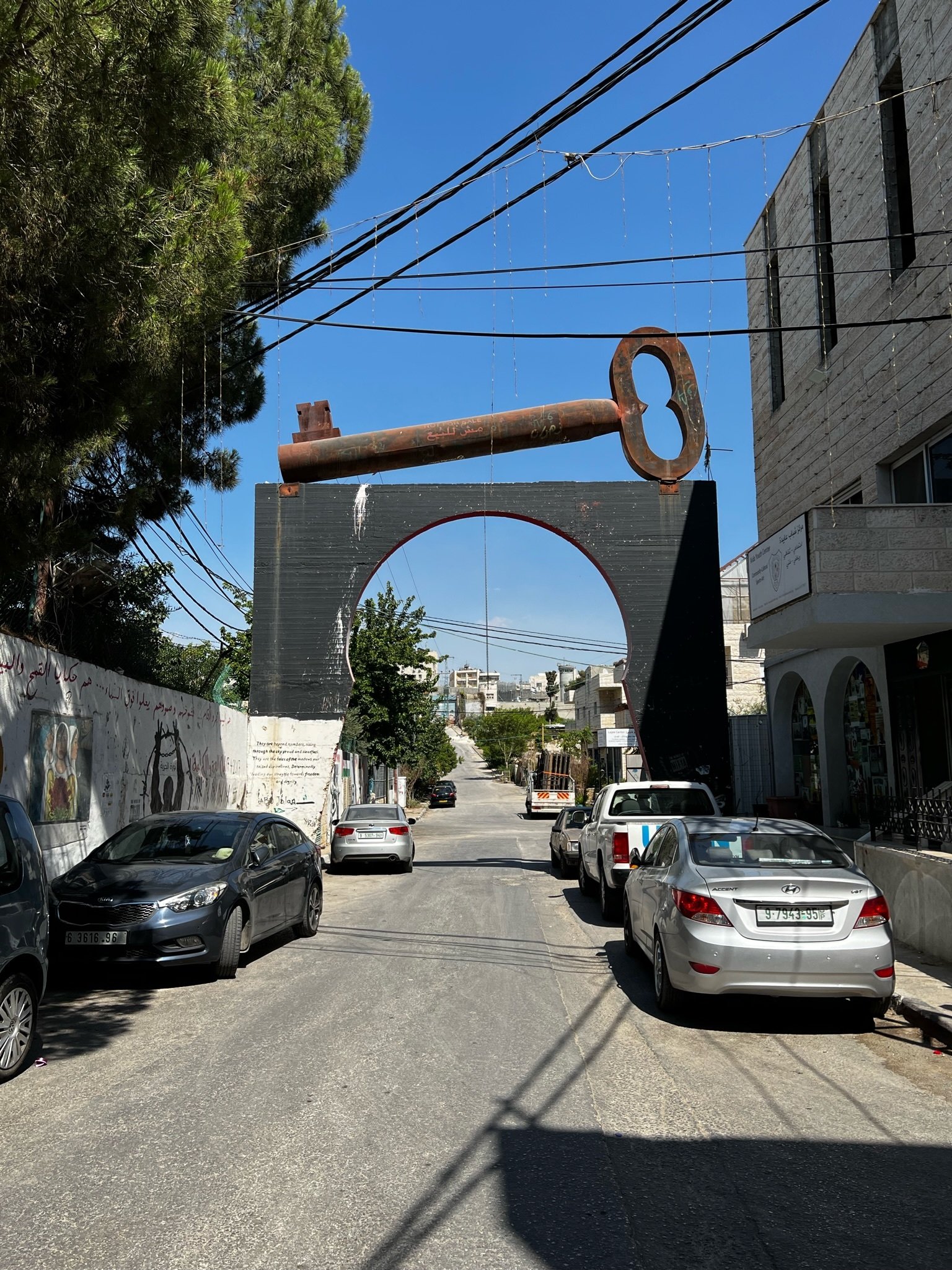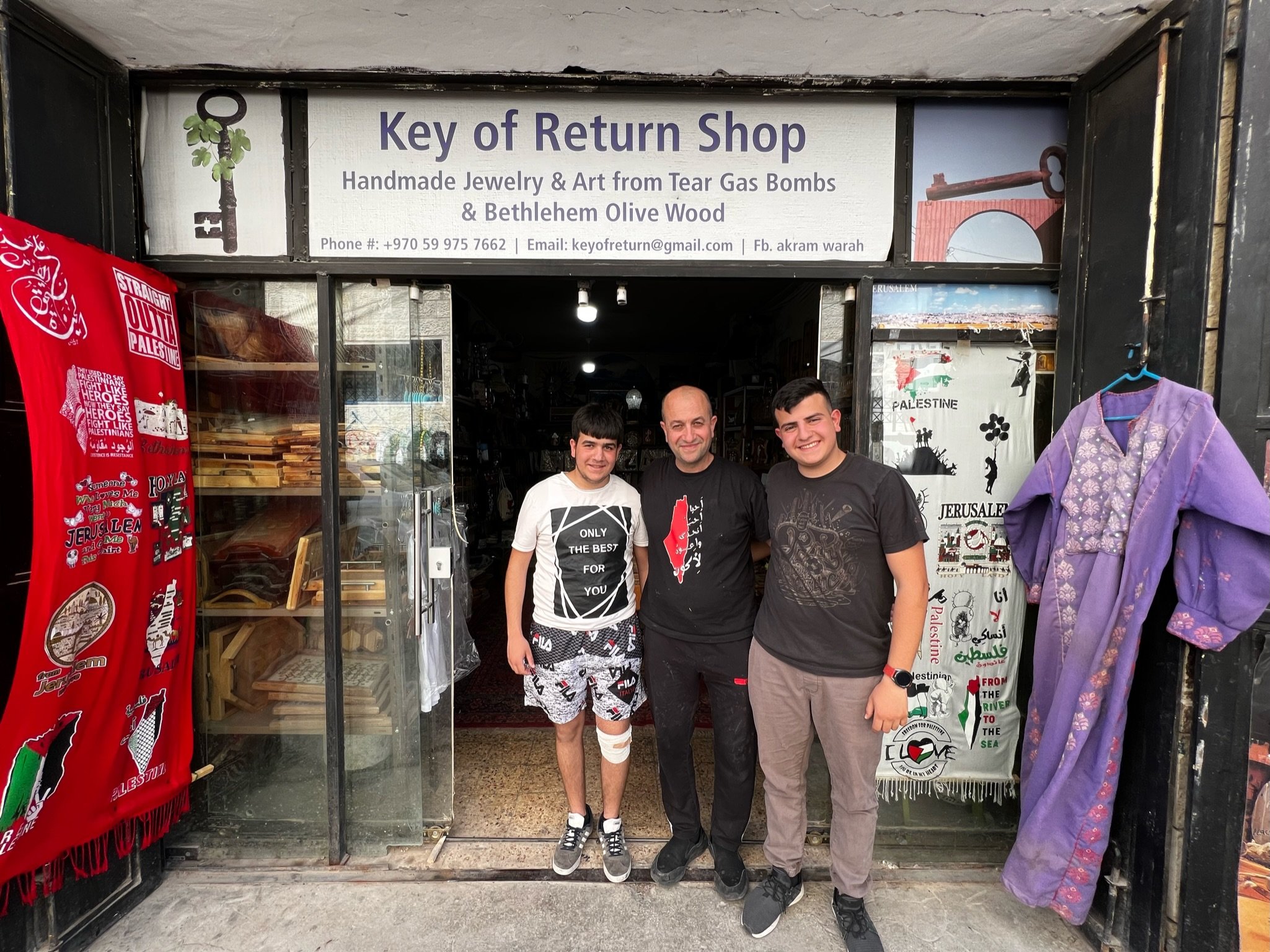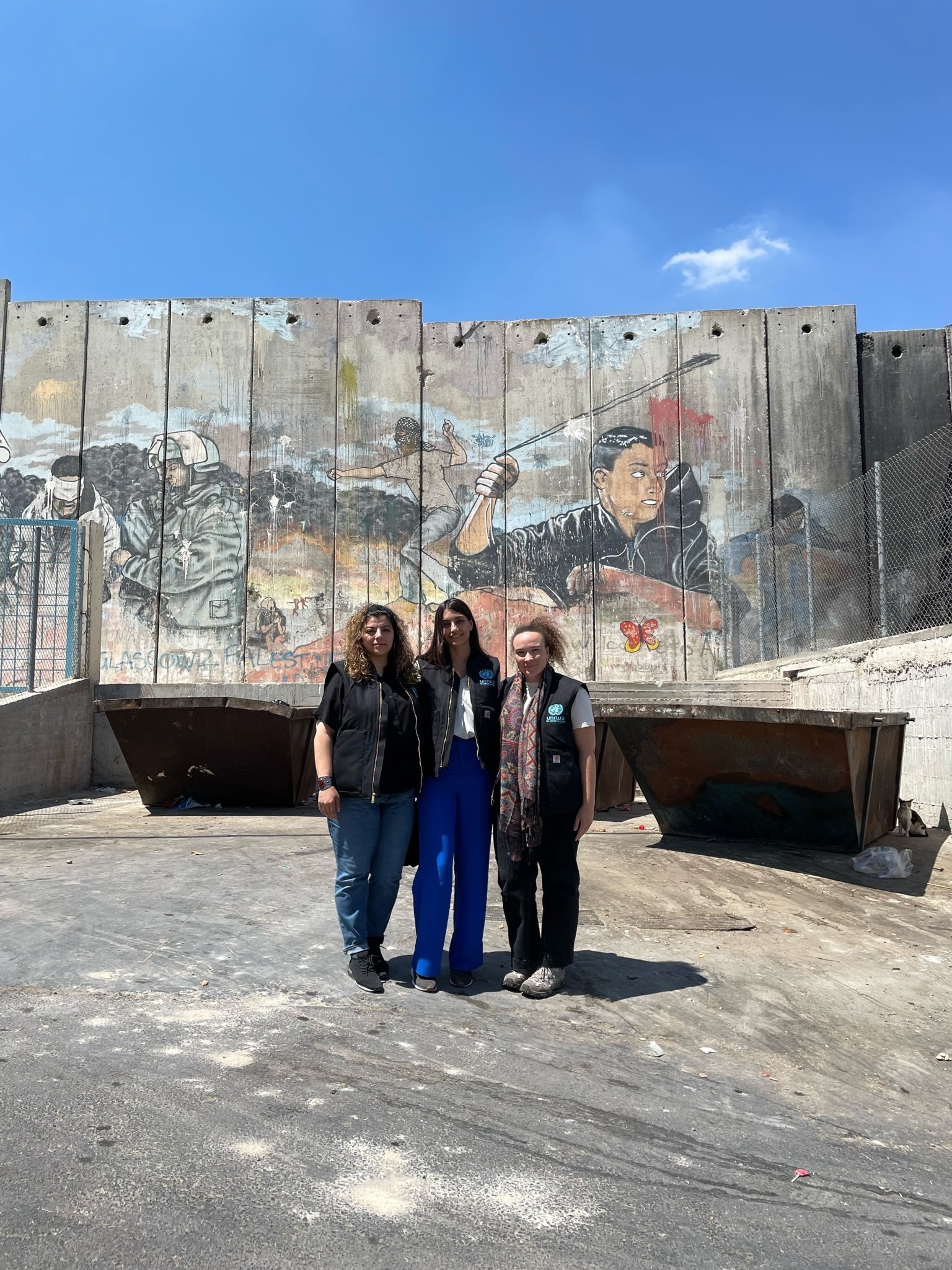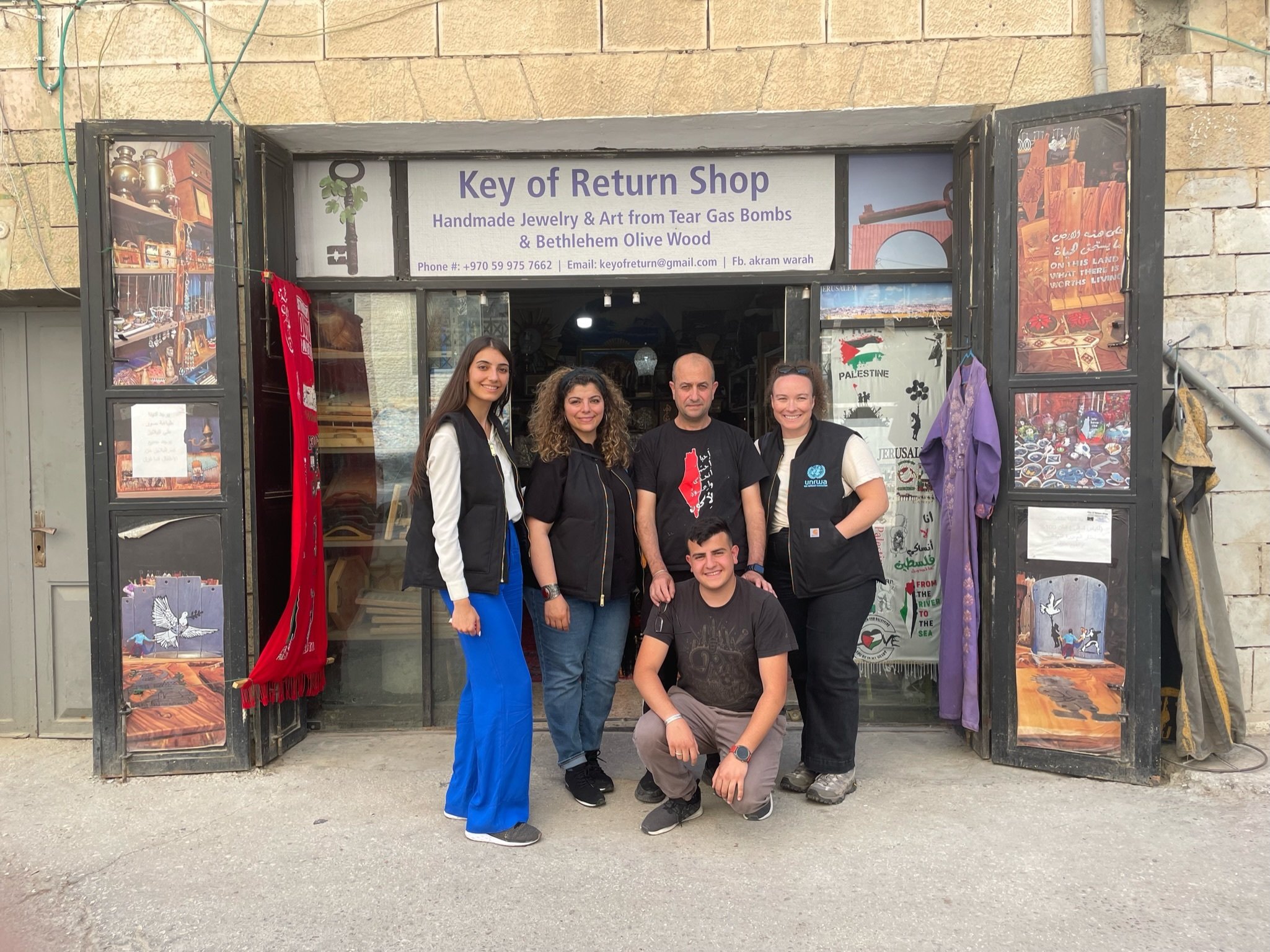Final Diary Series: Back to the West Bank
This piece is the fifth and final reflection of our communications team’s recap series highlighting our summer 2022 trip to Palestine.
As you’ve now learned through our field visit diary series, from health clinics to schools, UNRWA does a whole lot. And in Gaza, where more than half the population are refugees, UNRWA is seen as a lifeline, a source of stability and hope. But UNRWA can only do as much as your generosity allows.
UNRWA Vocational Training in Gaza
Palestine refugee students studying at the UNRWA Gaza Training Centre, Gaza City
In addition to the primary and sometimes secondary schools the Agency runs, UNRWA tries to mitigate joblessness among refugees through employment-related interventions like vocational training. The 16+ year-long blockade on Gaza has crippled its economy and has led to ever-rising unemployment.
The UNRWA Technical and Vocational Education and Training Program (TVET) provides practical training to young Palestine refugees, equipping them with relevant skills and expertise for Middle Eastern labor markets. The Agency runs eight centers with a capacity of about 7,500 trainees. Specializations include mechanics, building construction, plumbing, refrigeration, electrical installations, auto electrical and electronics, communication systems, mobile maintenance, hairdressing and fashion design, graphic design, accounting, assistant pharmacist, nursing, medical records, and physiotherapy. These courses are organized in response to local needs and most trainees actually succeed in securing employment!
Early in the morning on our last day in Gaza City, we got an insider tour of UNRWA’s Gaza Training Centre with school principal Rawya Hillis. We got to observe active classes and interact with dozens of students who were bursting with pride to demonstrate their projects. Students worked on projects ranging from colored glass windows, door making, carpentry, and the technicalities behind solar-powered machines. Gaza’s youth are brilliant and incredibly multi-talented. UNRWA’s vocational training centers are a space for these young refugees to expand their skills and potential.
UNRWA USA’s communications team poses with Palestine refugee students in Gaza enrolled in vocational training.
Fascinated by Rawya’s story, we invited her to join us on International Women’s Day for a special edition of Let’s Talk UNRWA which you can watch here. You will be moved to tears by her stories, strength, and role of Palestine refugee women in their communities. If you’re interested in making technical training possible for more Palestine refugee youth, please email us at info@unrwausa.org.
In true Palestinian hospitality, we never left anywhere empty-handed. Even on quick visits, our hosts insisted we accept sweets, drinks, handmade crafts, and gifts. The students gifted us a bundle of ornate Arabic calligraphy wood carvings. And as we prepared to load back into the UNRWA vehicles and head to the Erez crossing, we received an emotional surprise goodbye visit from two of our favorite UNRWA mental health counselors: Aya and Saly. Before our Gaza visit, we interviewed Aya and Saly about their incredible work as mental health counselors in Gaza amidst a blockade, military assaults, and a pandemic (check out that conversation here). They caught word that we were at the training center, so they showed up with even more parting gifts that left us with tears in our eyes: hand-painted ceramic pomegranates adorned with symbols from Gaza that we all proudly display on our desks now that we’re back home.
A cherished gift from Gaza
With full hearts and tearful eyes, we said goodbye to Gaza (for now). Our UNRWA driver transported us to the Erez border crossing where only a limited number of Palestinians who’ve been issued Israeli permits are allowed to travel. After going through metal cages and full body searches, we’d freely exit Gaza, a dream for millions of Palestinians trapped there, and drive to Bethlehem in the occupied West Bank.
back to the west bank
Two hours later, we were greeted with the huge separation wall that rips apart the West Bank. The wall signaled to us that we were near Bethlehem. While the artwork on the wall is breathtaking and symbolic — a feeling of bitterness and sadness is bound to captivate you. The three of us (Harley, Laila, and Diala) began walking toward the Aida refugee camp. A famous key statue marks the entrance of the camp and is a stark reminder of our vision — until there is a just solution to their plight, a world where Palestine refugees thrive.
Our first meeting was with Amjad Abu Laban, UNRWA Chief Area Officer for Hebron, and colleagues from UNRWA’s protection team. Palestine refugees joined to speak to us about their hardships living in the most teargassed place in the world.
Part of UNRWA’s role is to offer protection to Palestine refugees - but UNRWA is not mandated to be a protection service, thus its role is geared towards preventative measures. Refugees told us how their homes get tear gassed and how canisters often fly through their windows. As a preventative measure, UNRWA began installing heavy metal rods on windows to block tear gas from entering refugee shelters.




Palestine refugees also shared with us their experiences with child detention by the Israeli military. Once again, UNRWA is not mandated to work on such cases; this work is mostly done by organizations like Defense for Children - Palestine and the International Committee of the Red Cross. Regardless, these painful stories are a reality for many Palestine refugees living under occupation. And while we were a bit hopeful to see UNRWA affiliated with different organizations working to protect Palestine refugees; any human with a conscience would feel compelled to do and see more.
Following our briefings, we visited a famous accessories shop owned by a Palestine refugee. The Key of Return Shop in Aida refugee camp is famous for turning tear gas canisters into beautiful jewelry and art pieces. We each bought a few pieces and gifts for our loved ones before bidding our team and new refugee friends farewell.
masafer yata
The next day, our UNRWA colleagues drove us to the village of Umm al-Khair in Masafer Yatta. Masafer Yatta is a Palestinian community located a few miles from Hebron in the occupied West Bank. It is under imminent threat of demolition to make way for an illegal settlement. Masafer Yatta residents are refugees from other parts of historic Palestine — the majority of whom are displaced from the Palestinian Bedouin region of Beersheba. Palestine refugees living in Masafer Yatta face intense violence and harassment from armed settlers. We met Tariq Hathaleen, a community leader and teacher, who explained the current conditions and life in Umm al-Khair.
It was beyond difficult to hear about these conditions but it is the reality for Palestine refugees living under occupation. We learned that UNRWA provides economic empowerment initiatives such as olive grove planting in the valley to financially support some of the families in Masafer Yatta.
We invite you to read up and educate yourself and your community about Masafer Yatta. It breaks our hearts that Palestine refugees are in constant threat of dispossession from their homes and lands -- whether that's in Gaza or the occupied West Bank (including East Jerusalem).
closing
As our 2022 field visit diary series comes to a close, we reflect on the intense, educational, and exhilarating experiences we had. When we set out to capture our trip in just five blog pieces, we knew that condensing our experiences into our typical 700-word limit would not suffice in capturing our trip to Palestine. No amount of words can ever fully do justice to the profound impact this short trip had on us. We will be forever moved by the Palestine refugees we were privileged to meet from the occupied West Bank to the Gaza Strip to Masafer Yatta and hope we have the chance to reconnect when we return in early August 2023.
These Palestine refugee stories, their resilience, and their courage inspire us to double our commitment until there is a just political solution to their plight. At UNRWA USA, we dream of a world where Palestine refugees thrive, and we vow to continue working and motivating others toward that vision.
As we look ahead, we are excited to share that our next blog piece will feature our Executive Director, Mara Kronenfeld, and our Director of Strategic Programs, Jason Terry's 2023 field visit to Lebanon. These visits offer us a precious opportunity to connect with Palestine refugees on the ground and hear their stories. We take this privilege seriously and aim to educate our fellow Americans by sharing these powerful encounters and the many voices of UNRWA. You support our mission and bring more attention to the plight of Palestine refugees when you share our articles, so please share them widely.



